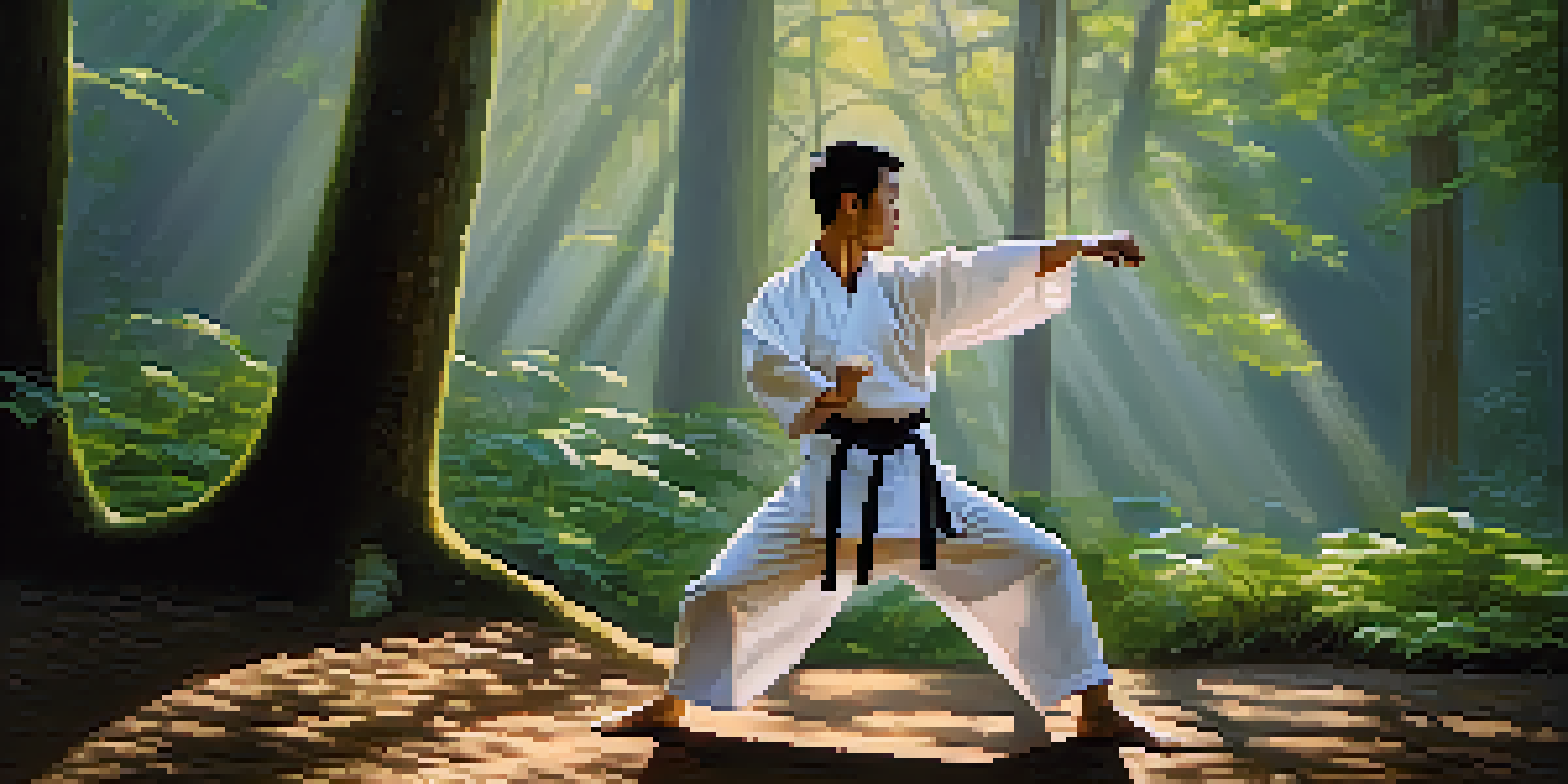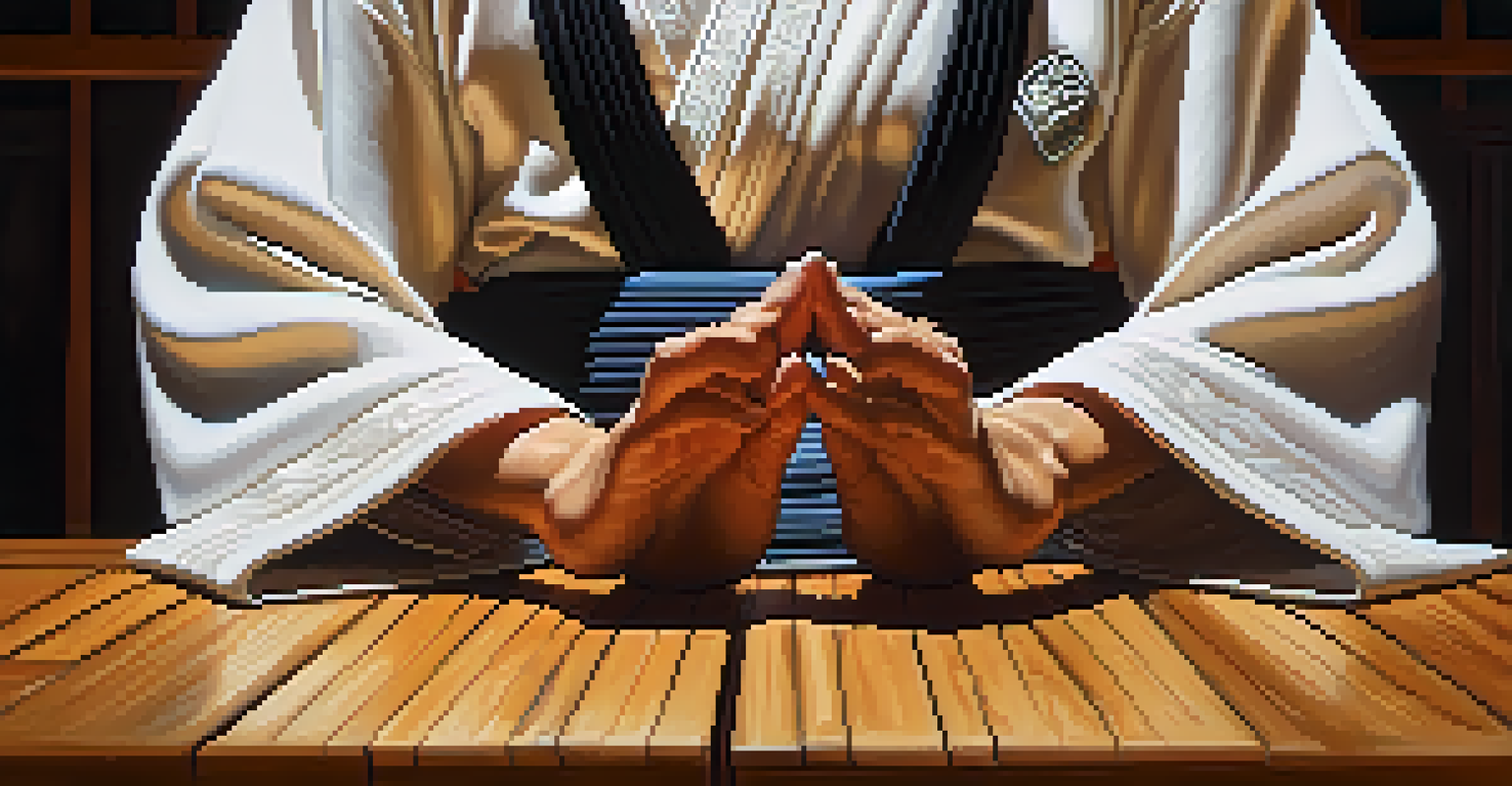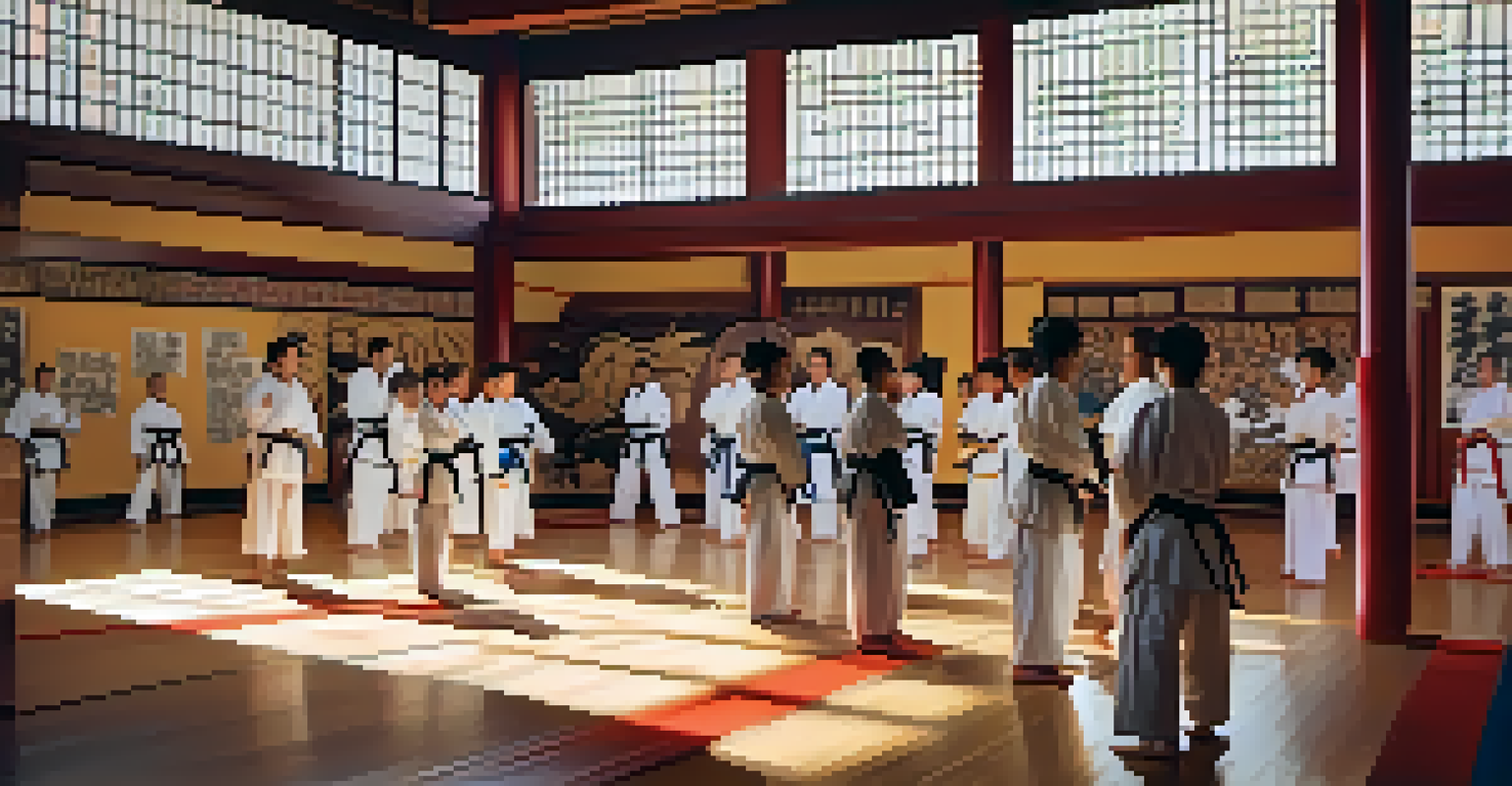Martial Arts and Spirituality: A Historical Connection

Understanding Martial Arts: More Than Just Fighting
Martial arts often conjure images of intense physical combat, but there's much more beneath the surface. At its core, martial arts is a discipline that combines physical prowess with mental focus and spiritual growth. This holistic approach is what sets martial arts apart from mere sports; it emphasizes the development of character alongside skill.
The ultimate aim of martial arts is not having to use them.
For many practitioners, martial arts serve as a path to self-discovery and inner peace. The rigorous training not only strengthens the body but also sharpens the mind and nurtures the spirit. Through techniques like meditation and breathing exercises, students cultivate a profound connection to themselves and the world around them.
This duality of physical and spiritual training is what makes martial arts a unique practice. It invites individuals to explore their potential not just as warriors, but as balanced human beings, fostering qualities such as patience, respect, and humility along the way.
Historical Roots of Martial Arts and Spiritual Practices
The historical connection between martial arts and spirituality can be traced back to ancient cultures across the globe. For instance, in China, martial arts developed alongside philosophies like Taoism and Buddhism, which emphasize harmony and balance. This fusion allowed practitioners to engage in physical training that also sought spiritual enlightenment.

In many cases, spiritual beliefs shaped the way martial arts were practiced. Techniques were often accompanied by rituals, meditation, and prayers, creating a deep-seated philosophy that extended beyond the dojo. This intermingling of the spiritual and physical was not merely a trend; it became the foundation of many martial traditions.
Martial Arts: A Holistic Discipline
Martial arts combine physical skill, mental focus, and spiritual growth, fostering personal development alongside combat abilities.
Similarly, in India, the practice of Kalaripayattu intertwined with Ayurvedic medicine and yoga, showcasing an intricate relationship between physical discipline and spiritual growth. These historical roots highlight the universal quest for a deeper understanding of oneself through physical activity.
The Role of Meditation in Martial Arts Training
Meditation plays a crucial role in the training regimen of many martial arts disciplines. Practitioners often incorporate meditation to enhance focus, clarity, and emotional regulation. By calming the mind, they can better connect with their bodies and the techniques they practice, leading to improved performance.
Martial arts is not about the physical fight, but a journey of self-discovery and personal transformation.
Moreover, meditation helps individuals cultivate a sense of presence, which is essential during sparring or competitions. Being in the moment allows martial artists to respond instinctively rather than reactively, promoting a flow state that enhances both skill and enjoyment. This connection to the present is often described as a form of spiritual practice.
In essence, meditation acts as a bridge between martial arts and spirituality, reinforcing the idea that mastery is not solely about physical capability but also about mental and spiritual alignment. This understanding encourages practitioners to look beyond the physical fight and embrace a journey of self-discovery.
The Influence of Eastern Philosophies on Martial Arts
Eastern philosophies, particularly those stemming from Buddhism and Taoism, have deeply influenced the development of various martial arts. These philosophies emphasize concepts such as mindfulness, balance, and the interconnectedness of all things. As students engage with these ideas, they often find themselves on a path to spiritual awakening.
For example, the concept of 'Wu Wei' in Taoism, which translates to 'non-action' or 'effortless action,' encourages martial artists to cultivate a state of flow. This principle teaches that by aligning oneself with the natural rhythm of life, one can achieve greater harmony both in combat and in daily life.
Meditation Enhances Performance
Incorporating meditation into training helps martial artists improve focus, emotional regulation, and overall performance.
By integrating these philosophical teachings into their practice, martial artists not only enhance their skills but also embark on a transformative journey that enriches their souls. This synthesis of physical and spiritual elements has garnered global appeal, making martial arts a popular pursuit for many.
Martial Arts as a Path to Personal Transformation
Many practitioners of martial arts report profound personal transformations, crediting their training with fostering resilience, confidence, and a sense of purpose. The rigorous demands of martial arts training teach individuals to face challenges head-on, both in the dojo and in life. This journey often leads to significant shifts in one's mindset and approach to adversity.
As they progress, martial artists learn to embrace failures as opportunities for growth. This perspective encourages a spiritual maturity that extends far beyond physical achievements. It cultivates an understanding that true strength lies not just in winning but in the lessons learned along the way.
Ultimately, martial arts serve as a powerful catalyst for personal transformation, helping individuals develop a strong sense of self and an enduring commitment to their spiritual journey. This is why many see martial arts not merely as a sport, but as a way of life.
Community and Connection in Martial Arts Culture
The sense of community found in martial arts is another aspect that enriches its spiritual dimension. Training with others fosters camaraderie and mutual respect, creating an environment where individuals can grow together. This shared journey builds strong bonds that often extend beyond the dojo, forming lifelong friendships.
Moreover, many martial arts schools emphasize values like respect, humility, and discipline, which further reinforces the community's spiritual foundation. Practitioners are encouraged to support one another, both in their training and in their personal lives, creating a culture of collective growth and understanding.
Community Fosters Personal Growth
The camaraderie and shared values within martial arts communities enrich individual experiences and promote collective spiritual development.
This sense of belonging and shared purpose not only enhances the individual experience but also cultivates a deeper appreciation for the practice as a whole. Through these connections, martial artists learn that their journey is not a solitary one but part of a larger tapestry of human experience.
Conclusion: The Interwoven Path of Martial Arts and Spirituality
The historical connection between martial arts and spirituality is rich and multifaceted. From ancient practices to modern interpretations, this relationship continues to evolve, inspiring countless individuals to pursue martial arts not just for self-defense but for personal growth and spiritual enlightenment. As practitioners train their bodies, they also nurture their minds and spirits.
Ultimately, martial arts offer a unique journey that integrates physical, mental, and spiritual development. This holistic approach helps individuals navigate life's complexities with grace and strength, cultivating a profound sense of purpose and belonging. Each punch and kick becomes a step on the path to self-discovery.

As we reflect on this interwoven path, it becomes clear that martial arts are more than just techniques; they are a way of life that encourages us to seek balance, inner peace, and a deeper understanding of ourselves in a chaotic world.